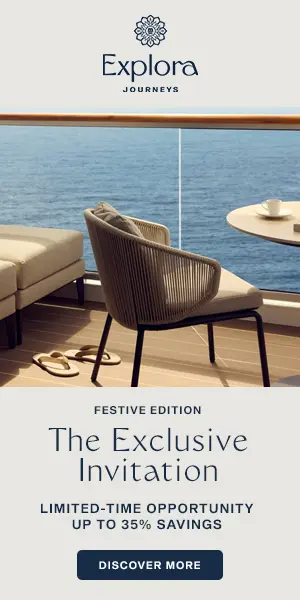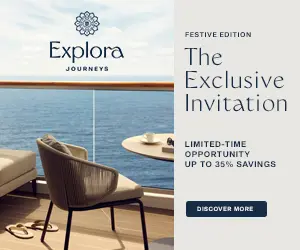Rethinking Luxury: In Search of the Un-Google-able Experience
by David Cogswell
Exclusive, VIP experiences are part of what Grutzner calls “un-Google-able events, like ‘Luxury Gold in Whistler,’ with local ski legend and Olympic athlete named Rob Boyd. Photo: Shutterstock
Jon Grutzner, president of the U.S. for Insight Vacations and Luxury Gold, is happy to be “back home” in the business of land vacations.
Grutzner joined The Travel Corporation as head of its upper premium and luxury land vacations brands eight months ago, after 10 years directing sales for Azamara Club Cruises, a division of Royal Caribbean. Previous to that, he spent nearly two decades in the land tour business.
“Until the last 10 years I have always been in land,” Grutzner told Travel Market Report. “It’s where I cut my teeth. It feels more at home than the deep-water ocean. I love the experiences you can do in-destination and the more leisurely pace you have on land versus on cruises. I enjoyed my experience at Azamara. It’s a great company. But for me, being at Insight and Luxury Gold is like coming home.”
Grutzner worked previously with Collette, the Rhode Island-based tour operator, which is also a land vacations company, but with a very different product and company culture than where he is now, reflecting the broad range of diversity in the packaged travel segment.
“I love the cruise side, but it seemed like everyone was kind of doing the same thing in the cruise space,” he said. “I love my experiences in deep water. There are some beautiful things that they are doing, but those are really kind of contrived experiences. When you get off in a port with a thousand, maybe two thousand people, the type of experiences you can have are limited to the duration around the port. And it’s basically those tourist types of experiences that you get.”
Compared to guided vacations, the cruise port experience only scratches the surface of a destination. On a land tour, at a more leisurely pace and with more time at the destination, clients have a nearly infinite array of ways to experience a destination.
The land side of the industry is more diverse, with many different companies built around individual founders who had differing personalized visions and styles. Land tours offer an enormous range of possible experiences. But selling land also poses different challenges for travel agents and requires different selling skills and strategies. Bottom line, Grutzner feels that land vacations better serve the needs of the evolving traveler.
“I believe the direction — especially for the well-traveled, affluent guest — is wanting to have more authentic human connection in-destination,” said Grutzner. “And that’s the big thing the guided vacation space is doing.”
Smaller groups and a more leisurely pace are keys to a more intensified exploration of the destination. “With the guided vacations space, you can have more of an authentic experience and a better human connection purely based on the size of the group and the fact that you’re not rushed to get back on that vessel,” he said. “For me, I believe — especially in the upper premium and luxury space — that is the direction that that guest is going. It’s what they are really looking for. They want that un-Google-able experience.”
How to sell to affluent travelers
Selling immersive luxury experiences to well-traveled, affluent clients requires different skills than selling cruises, weekends in Las Vegas or beach vacation packages. But commissions are also higher and that makes it worth the effort of learning new selling strategies.
Luxury Gold has launched a new campaign to help travel agents rethink the luxury market and their approaches to it.
“My biggest concern as president is that travel agents are selling the product like a commodity,” said Grutzner. “If they don’t see the differentiation between the contemporary upper premium and luxury space, it’s hard to communicate the value to that guest and meet their needs, especially if they are discerning guests and their criteria reflect a higher level of travel than someone who is just wanting to go from point A to point B.”
To meet the challenge of adapting to a changing market, TTC has expanded the Insight Vacations and Luxury Gold sales force by a third, to include 16 district sales managers.
“We’re increasing our support out there in the field by increasing our DSMs,” said Grutzner. “My mandate is not just to grow within our current and traditional partnerships, but to extend those partnerships to new partners, more partners in the field.”
A key to expanding sales is to adjust to the mindset of the affluent, experienced traveler.
“I think the word ‘experiential’ is overused, but that is what they are looking for,” said Grutzner. “Their tastes are evolving. It’s the same as with buying cars. When you first buy a car, you are just looking to get from point A to point B. As you purchase more cars, you tend to look for more amenities. The first car I bought was a stick shift. Now I have a higher standard. I never purchase a car now that doesn’t have a navigation system and heated seats. Your tastes evolve as you become a more experienced purchaser.”
Grutzner says it’s the same with travel. “As your tastes evolve, you move to different levels of experience,” he said. “We think that’s what’s happening, especially in the U.S. Guests are becoming more knowledgeable in their travel experiences, so they have higher expectations. They are wanting human connections, more exclusivity, and things they can’t do on their own.”
Exclusive, VIP experiences are part of what Grutzner calls “un-Google-able events.”
“With ‘Luxury Gold in Whistler,’ we bring in an Olympic athlete named Rob Boyd, a local ski legend,” said Grutzner. “He sits around and talks to our guests. They have this robust conversation with a local legend.”
On the “Southern Grace” program, the group gets to meet a music legend named Charlie McCoy. He’s one of the lesser-known megastars of music. He played on recordings of Elvis Presley, Bob Dylan, Johnny Cash, Chet Atkins, Waylon Jennings, Kris Kristofferson, Paul Simon, Ringo Starr and Loretta Lynn. For 15 years, at his height of activity, he played on 400 recording sessions a year.
“The reason clients would buy a packaged product is to do things they can’t do on their own, such as getting in front of a line, having these VIP-type of experiences,” said Grutzner.
“That is really what that affluent guest is looking for, not just going to Whistler, but connecting on a different level; not just going to Nashville, but trying to understand the culture through a human connection. That’s, I believe, the direction that this space is going to. It’s not just about going to a destination, but it’s how you can experience that destination, how a company is able to deliver those experiences differently.”
One-to-one education
To meet the challenge of training travel agents to adapt to the changing, upwardly mobile travel market, the company has increased its number of field district sales managers in order to be able to provide more one-to-one learning experiences for travel agents.
“For us, it’s teaching travel advisors how to ask those qualifying questions,” said Grutzner, “trying to understand what are the hot buttons, what is important to a discerning guest, trying to connect the product with that guest’s wishes. It’s interesting, it’s the same qualification process as when they’re doing a buns-on-beaches type of experience, trying to match those up with the affluent client.”
In earlier times, it may have been a good pitch to say, “Everyone who goes to Dubai stays in this hotel. But that’s not the right pitch for today’s affluent client. The discerning guest, who is looking for exclusivity, doesn’t want to hear that. They don’t want to go where everyone is going. So, we are trying to teach those travel advisors what is important to that discerning or well-traveled guest, to find out what ticks the boxes.”
With an expanded sales staff, the company is able to offer more personalized training. “It’s not a cookie-cutter type of experience, but rather trying to sit down one-to-one and to evolve them into that space,” said Grutzner. “It’s also about using techniques that resonate with the well-traveled guest.”
Sales presentations need to be focused on the preferences of the affluent traveler. “While in the past, you might have done a multi-branded night where everyone comes and talks about Europe,” said Grutzner, “what we’re finding is that for that well-traveled guest, it’s more about having that more intimate experience and talking more specifically about destinations that resonate with that guest.”
It’s also about moving from general to specific. “A well-traveled guest may not get off their barcalounger to go to listen to a general presentation on Europe,” said Grutzner. “But they might come in to hear about the ‘Ultimate Ireland’ program with Ashford Castle; or our ‘Remarkable Russia’ program that has the Trans-Siberian Train option, or meeting with a former spy of the KGB, or going to the Bolshoi Theater.
“It’s trying to be more specific, and going from tactical to technical, on what things are going to resonate with that well-traveled guest.”
























